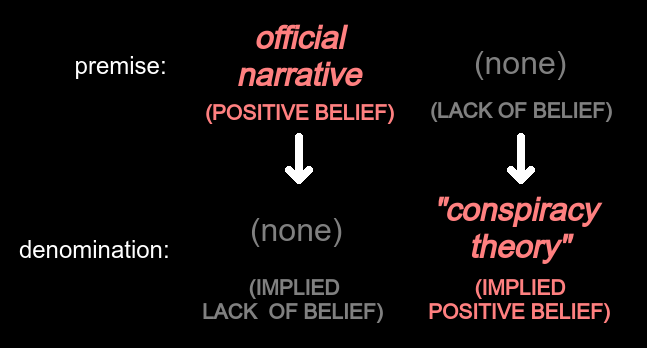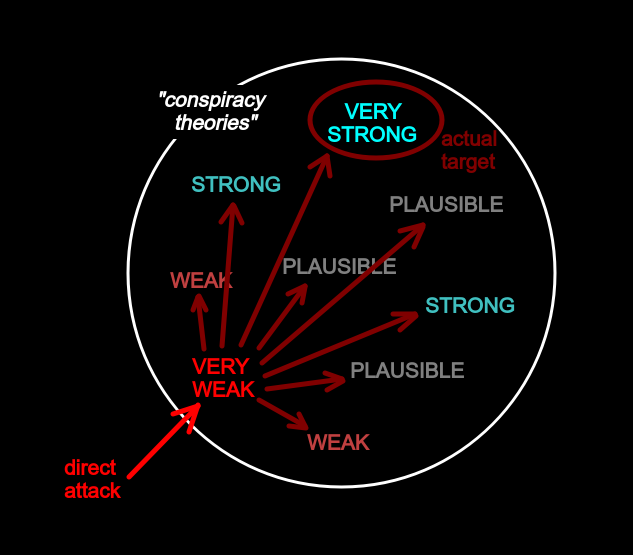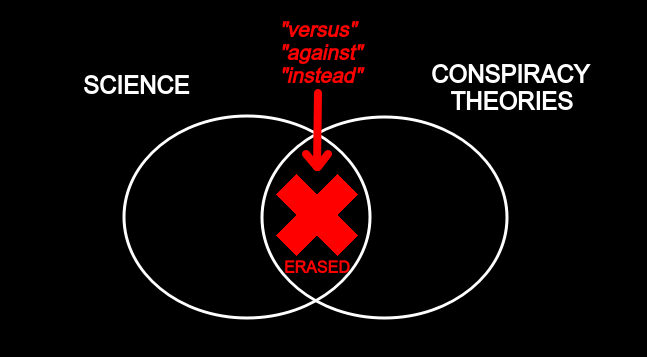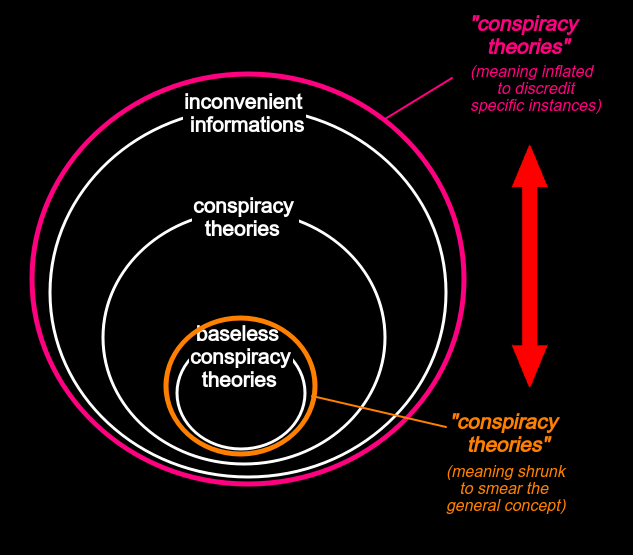Conspiracy Denialism
Conspiracy Denialism is an ideology that promotes a religious belief in the infallibility/incorruptibility of mainstream doctrines and institutions, while hiding behind an equally religious denial of every competing idea, all of which are arbitrarily labeled as "conspiracy theories".
It is one of the main pillars of Neo-Obscurantism and State Pseudoscience.
In its "moderate" outward form, it merely denies the existence of conspirations; in its most radical one, it can go as far as to deny the very existence of any elitarian/oligarchical organization, and the very possibility that governments/institutions might deliberately lie to the public or act for goals that go against the interests of the people, regardless of whether an actual "conspiracy" is involved or not.
Features
This section describes the features that qualify Conspiracy Denialism as a form of religious and political extremism.
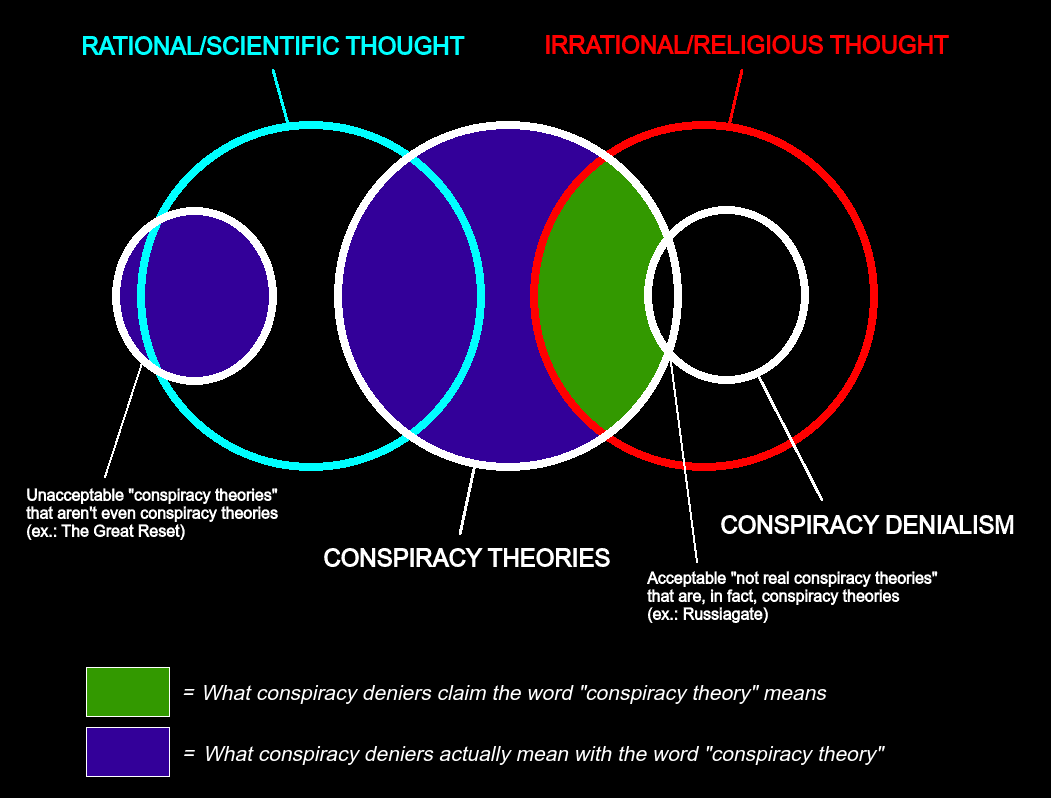
This picture sums up Conspiracy Denialism's true nature and rhetoric.
Dogmatism
Denialist rejection of conspiracy theories does NOT derive from "doubt" or "skepticism", but from a pre-existing belief in the infallibility of authority.
Its beliefs derive neither from self-evident axioms nor verifiable evidence, but from a revealed dogma ("conspiracies aren't real"), which is arbitrarily assumed to be true *a-priori*, and stands as the hidden premise of every subsequent argumentation; logic and evidence are automatically discarded the moment they conflict with it, rather than the other way around, in direct violation of both rationality and scientific method.
Irrationality
Conspiracy Denialism disregards one of the main principles of rational thought, the principle of non-contradiction. Mainstream narratives are accepted with no concern for their internal consistency, and keep being promoted even in spite of blatant self-contradictions. It regularly expects several incompatible claims to be simultaneously accepted as proven truths, and several reciprocally contradicting sources to be simultaneosly held as absolute authorities.
Only when such discrepancies are explicitly brought to attention exceptions are made, and priority is assigned in a completely arbitrary way depending on which version is more convenient at the moment. This doublethink is evident by how often conspiracy denialists paradoxically end up openly promoting conspiratorial beliefs when they are convenient to their political agendas, hiding the blatant hypochrisy by carefully avoiding to apply the term "conspiracy theories" to its own beliefs.
Extremism
Conspiracy Denialism represents *by definition* one of the most extreme positions as possible on the issue of conspiracies; on a spectrum ranging from total obsession ("everything is a conspiracy") to total denial ("nothing is a conspiracy") it takes by default the second extreme and, as it's often the case with political extremism, it defines *every* other possible position (even including denialist positions not as extreme as its own one) as the opposite extreme; this means that Conspiracy Denialism is inherently more extreme than conspirationism, and should be therefore placed under a much heavier burden of proof compared to the latter.
Fanaticism
Conspiracy Denialism is not content with merely denying the existence of conspiracies, it cathegorically demands to not even consider them as a possibility; the sole act of introducing the idea of a conspiracy, even just at the mere level of hypothesis, is usually enough to trigger reactions of ridiculing and/or shaming, displaying a level of thought-suppression that is typical of religious cults and sects.
The aim of Conspiracy Denialism is to set conspiracies as a taboo subject, something that should be never discussed or even thought.
Superstition
By its very nature, Conspiracy Denialism deems important economic/social/political actors to be somehow immune to ordinary human weakness and corruption; this necessarily implies the existence of some kind of unstated supernatural quality that prevents them to act in accordance to their human nature; authorities are not viewed simply as more credible people, they are viewed as supernatural beings removed from the natural laws of the world; for all practical purposes this is undistinguishable from the ancient belief in a divine origin of authority; this places Conspiracy Denialism strictly and squarely into the realms of paranormal beliefs and theocratic worship.
It is important to notice that, while conspiracy theories can also often degenerate into religious beliefs, conspiracy denialism is *intrinsically* a religion:
CONSPIRACY THEORIES | CONSPIRACY DENIALISM |
Can either derive from a pre-existing faith or from a rational investigation/scrutiny. | Always derives from a pre-existing faith. |
Its positions can range from moderate to extreme. | Its position is extreme *by definition*. |
Can be open to doubts and contradictory. | Demands a blind and unconditioned submission. |
Promotes curiosity and research. | Vilifies curiosity and research. |
Might or might not involve some kind of supernatural belief. | Necessarily involves an unstated belief in an undefined supernatural essence. |

